Pecan Paraguay garden
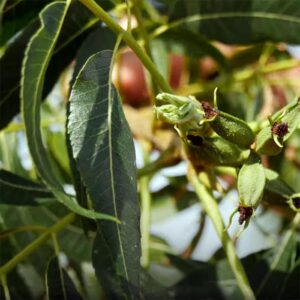
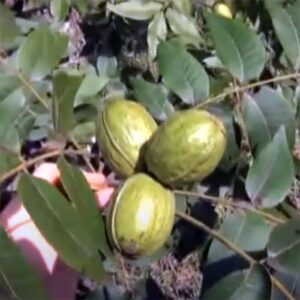
In the equatorial and tropical regions of Central and South America, industrial orchards play a significant role in agriculture, producing fruits from various crops such as coffee, cocoa, mangoes, nuts, and citrus fruits. These crops require specific conditions and meticulous care to ensure high yields.
Coffee (Coffea spp.) Coffee plantations are prevalent in countries like Brazil, Colombia, and Costa Rica. Successful coffee cultivation requires elevations between 600 and 1200 meters above sea level, along with a moderate climate with abundant rainfall. Maintenance includes regular tree pruning, weed control, and soil moisture management. Coffee does not grow in hot lowland regions, only in mountainous areas.
Cocoa (Theobroma cacao) Cocoa is grown in shaded conditions, usually under the canopy of taller trees that protect it from direct sunlight. Regular fertilization and pest control, targeting pests like the cocoa moth, are crucial for maintaining healthy cocoa trees.
Mango (Mangifera indica) Mangoes thrive in warm tropical regions with well-drained soils. Maintenance includes timely irrigation, pruning to stimulate fruiting, and protection from insect pests.
Nuts (Carya, Bertholletia, and others) Industrial nut orchards require deep, fertile soils and constant care, including protection from insects and fungal diseases.
Citrus (Citrus spp.) Citrus orchards, such as those for oranges, lemons, limes, and grapefruits, require sunny locations and regular irrigation. Key maintenance tasks include protection against diseases like citrus canker and timely fertilization.
Brazil, Paraguay, and Uruguay cultivate various industrial crops that play a crucial role in rural economic of these countries.
The primary crops in Brazil’s industrial orchards are coffee, cocoa, mangoes, and oranges. Brazil is the world’s largest producer of coffee and also leads in orange production and processing into orange juice.
In Paraguay, industrial horticulture focuses on citrus fruits like oranges and tangerines, as well as mangoes and nuts, particularly pecans.
In Uruguay, the emphasis is on cultivating citrus crops such as oranges, lemons, and limes. The country’s citrus orchards are renowned for their quality, and the fruits are exported to various countries worldwide.
On issues of reclamation and creation of an industrial garden

Pecan Paraguay garden
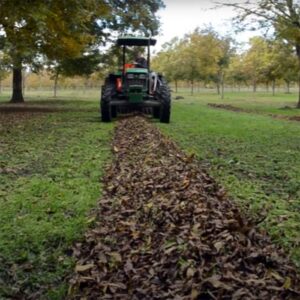
Picking pecans in the garden
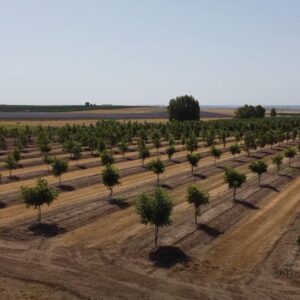
Young pecan garden
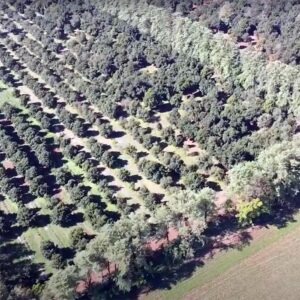
Macadamia garden with protective forest belts
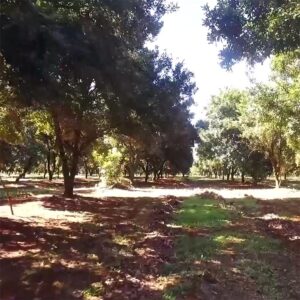
Makadamia nuts garden
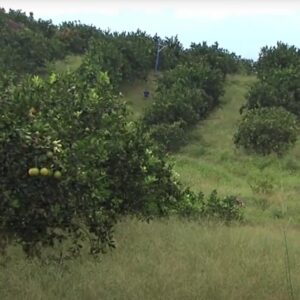
Citrus garden in Paraguay
There are differences between an industrial orchard and a garden at home. Industrial orchard are set up to generate income from the sale of fruits, nuts, etc. Garden means a beautiful garden near the house for pleasure, garden оn a personal plot. Industrial orchard is a garden for production. Although a certain modern multi-crops agricultural technology in the modern orchard gives beauty to it. Not only beauty, but also environmental sustainability.
Industrial orchards in tropical and equatorial regions face several ecological challenges that require a comprehensive approach.
– Ecological Issues: soil degradation associated with intensive farming and nutrient leaching require the use of balanced fertilizers and soil conservation methods. Additionally, monocultures increase the risk of disease and pest outbreaks, necessitating crop rotation and intercropping.
– Pest Control: pests such as citrus canker, coffee borer beetle, and cocoa moth can cause significant crop losses. Integrated pest management methods, including the use of biological control agents like beneficial insects and fungal preparations, as well as the prudent use of chemical pesticides, are employed to combat these pests.
Industrial orchards have their own service life, after which the yield decreases. It is necessary to provide for the reclamation of the garden and the removal of wood suitable for construction and industry. Some tree species cultivated in industrial orchards can provide not only fruits but also timber over time. Any orchard requires reclamation after a certain period, and crop rotation, similar to field crop rotation, is carried out.
– Cocoa (Theobroma cacao). In addition to producing fruits, cocoa trees can also be used for timber, which, although of lower quality, is utilized in local construction and furniture making.
– Pecan (Carya illinoinensis). Pecan trees, grown in Paraguay and other countries, provide not only delicious nuts but also valuable wood, which is used in carpentry and furniture making.
– Rubber Tree (Hevea brasiliensis). The rubber tree, cultivated for natural rubber production, also yields wood that is used in furniture making and flooring.
Using such trees allows for the efficient use of resources, yielding both fruits and valuable timber, thereby increasing the economic benefits of industrial orchards.
Modern agrotechnical means are employed in the tropical and equatorial regions for planting and maintaining industrial orchards, significantly enhancing the efficiency and productivity of agricultural operations.
Specialized tree planters are used to ensure precise placement of seedlings at the correct depth and optimal spacing. For orchard maintenance, mulchers and cultivators help keep the soil in good condition, remove weeds, and retain moisture.
Irrigation, especially in regions with irregular rainfall, is carried out using automated drip irrigation systems, which save water and provide even moisture distribution to the plants.
Sprayers are also widely used for pest control and fertilization, ensuring even distribution of plant protection products and nutrients. Overall, the mechanization of processes in industrial orchards helps reduce labor costs and increase yields, which is especially important in large-scale production.
We provide agronomic services for the examination and expertize of land to plant orchards and existing industrial gardens.